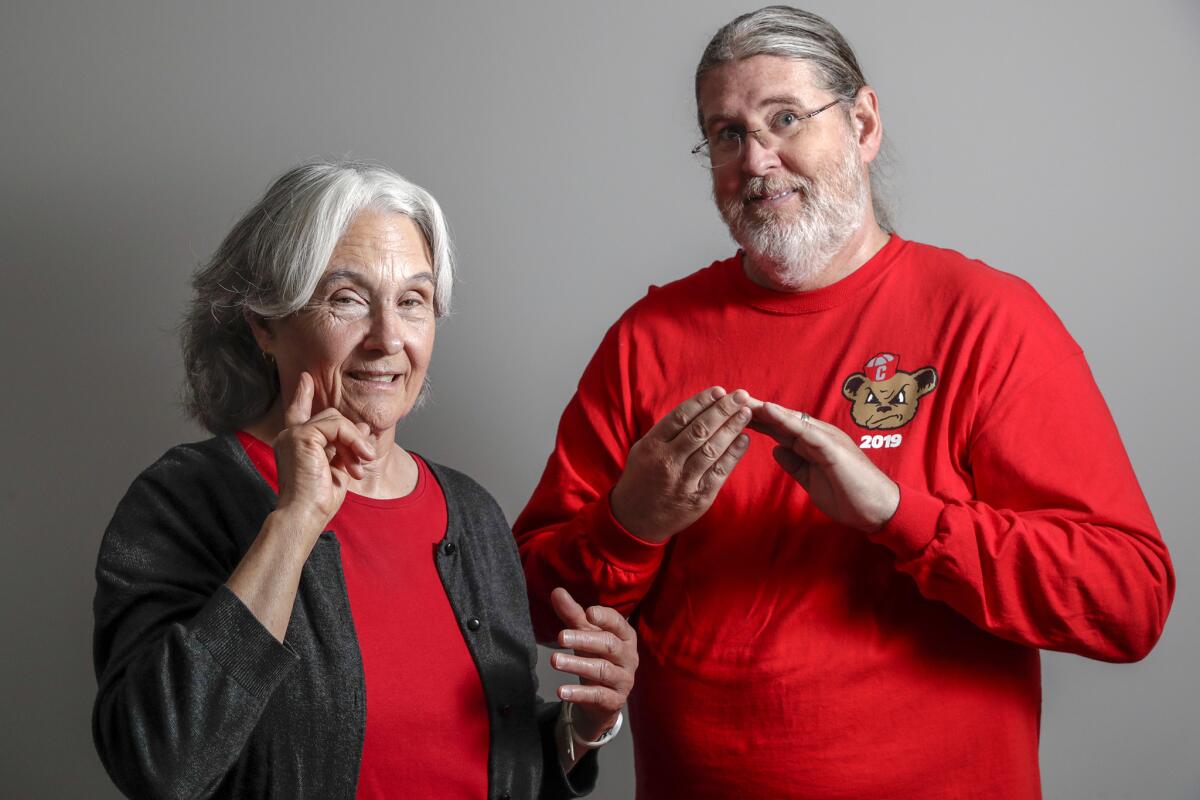Column: Are anti-vaccine parents risking the health of their unborn grandchildren?

- Share via
Reporting from Riverside — Mark Dorsey’s grandmother first suspected a problem with his hearing when he was a baby. The family lived near what was Norton Air Force Base in San Bernardino; jets routinely roared overhead, but the baby never reacted to the noise.
Alarmed, Dorsey’s mother did what a lot of parents in that situation would do: She got out some pots and pans and banged them near the baby like it was New Year’s Eve.
The baby did not flinch.
Mark’s deafness was not a complete surprise to his family. In the spring of 1966, when his mother was nearing the end of her first trimester of pregnancy, she contracted rubella, also known as the German measles. It was the tail end of a rubella epidemic that swept across the U.S. in the early 1960s, infecting an estimated 12.5 million people. A vaccine would not be on the market for several years.
Dorsey’s mother was fine, but doctors told her there was a 90% chance her baby would not be.
Babies whose mothers are exposed to rubella in the first trimester face dire problems. The rate of miscarriage and stillbirth is high.
If babies survive in the womb, they might be born with catastrophic defects — deafness, blindness, heart problems, liver and spleen damage, cognitive impairment.
Dorsey, who has worked as a counselor at the California School for the Deaf in Riverside for 23 years, considers himself lucky to have been born only deaf.
He is the very happy father of four (hearing) children. At 51, with rimless glasses, a small hoop earring, and a graying ponytail, he looks like the kind of aging baby boomer you’d see at a rock concert. As it happens, he is a devoted Deadhead, having attended at least 200 Grateful Dead concerts in the last 30 years.
He and other deaf fans stand up front in the “deaf zone,” close to speakers. There are interpreters who sign the lyrics, while deaf Deadheads hold balloons, feeling vibrations as the band plays. This summer, he will see the Dead in Denver, Washington and the Bay Area.
“I love my life,” he told me. “I wouldn’t change it.”
::
I was introduced to Dorsey by one of his colleagues, Lorna Rutherford, who has worked at the California School for the Deaf as a counselor and social worker for 46 years. She contacted me after I wrote about the proposed California law that would more closely monitor vaccine exemptions for children whose parents claim they have medical reasons for opting against immunization.
She worries, with all the news about recent measles outbreaks, that people have forgotten just how devastating rubella can be. (Rubella is the “R” in the MMR vaccine, which also protects against measles and mumps.) Rutherford, 67, is not deaf.
I met Rutherford and Dorsey at the school. We sat in her office on the tranquil 60-acre campus of low-slung brick dormitories and classrooms. Despite an enrollment of close to 400 students from kindergarten to 12th grade, it was exceedingly quiet.
When she began working in Riverside, Rutherford told me, the school population was much larger because there were so many kids whose mothers had contracted rubella in the 1960s, before an effective vaccine became available in 1969. Those kids, she said, were always described as the “rubella bulge.”
“Since the MMR vaccine,” she said, “we have had very few ‘rubella babies’ — although worldwide, the leading disease causing deaf-blindness is still rubella.”
As the three of us chatted, Rutherford and Dorsey signed to each other. Rutherford translated for me.
::
My colleague Soumya Karlamangla, who is on the measles beat, has written about a cohort of young adults who have been dubbed the “Wakefield generation.”
Now in their early 20s, they were infants in the late 1990s and early 2000s, the height of the hysteria caused by the since-discredited study by the British doctor Andrew Wakefield, who linked vaccines to autism.
Fearing autism, many parents opted not to vaccinate, putting their now-adult children at risk for resurgent diseases like measles, which has made a comeback recently despite being declared eradicated in the United States in 2000.
So far this year, more than 625 measles cases have been diagnosed, the highest number in more than two decades. In Los Angeles, UCLA and Cal State L.A. imposed a quarantine after unvaccinated students at each school came down with the virus.
Measles is extremely contagious. A respiratory infection that causes a rash, fever and flu-like symptoms, it can lead to pneumonia, encephalitis and even death.
Generally, the disease is being introduced by travelers or tourists who come to the U.S. from other countries, as was the case with the 2014 Disneyland measles outbreak.
That was the outbreak that inspired state Sen. Richard Pan, a pediatrician, to author a law ending spiritual or philosophical exemptions to mandatory vaccinations. After that law went into effect, the vaccination rate rose. This year, Pan has proposed a new law that would tighten requirements for parents asking for medical exemptions for their children.
There are many legitimate reasons to refrain from vaccinating a child. Children who are sick, allergic to some of the ingredients in vaccines, or whose immune systems are compromised should not be vaccinated.
But imagine a scenario where a girl whose parents refused to vaccinate her grows up, gets pregnant and then contracts a virus like rubella.
“It’s the grandchildren of those strong anti-vaccination activists who will be affected,” Rutherford said. “It’s job security for us, unfortunately. That’s gallows humor, but we are going to get more deaf kids coming here.”
Twitter: @AbcarianLAT
More to Read
The biggest entertainment stories
Get our big stories about Hollywood, film, television, music, arts, culture and more right in your inbox as soon as they publish.
You may occasionally receive promotional content from the Los Angeles Times.









